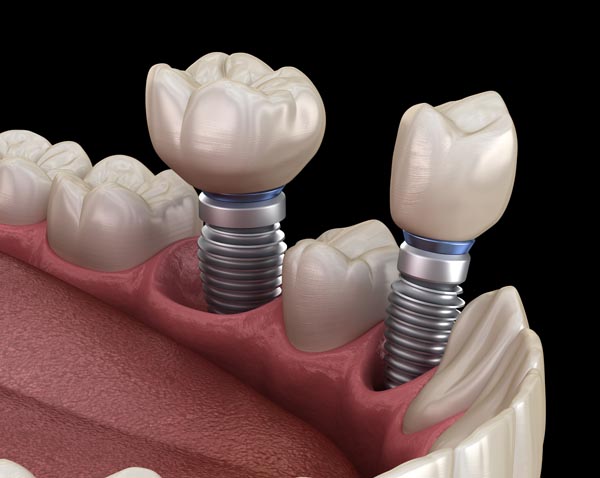Dental Implants and X-Guide

In addition to implants and conventional dentures, implant supported dentures represent another option available to patients for replacing missing teeth. The option offers some of the benefits of both dentures and implants. The more precisely an oral surgeon can place an implant, the better the aesthetics and functionality will be once the prosthesis is placed. X-Guide® is a new dynamic 3D navigation program that allows surgeons to place an implant more accurately.
Advantages of implant supported dentures for patients
Conventional dentures, especially on the lower jaw, can become unstable when talking, biting or chewing. This instability can result in slippage of the denture. Because conventional dentures sit directly on the gums, sore spots can develop due to friction. Additionally, removal of natural teeth can cause the jawbones to lose shape over time due to bone loss.
Dental implants look and function more like natural teeth than dentures. Implants help to prevent bone loss, as well as the change in jaw shape that can result. However, the more teeth that need replacement, the less practical and affordable it can be to place an individual implant for each.
Implant supported dentures require the placement of fewer shafts into the bone, which can be more convenient for the patient. However, even those few implants placed in the jaw can help prevent bone loss. The implants hold the dentures more securely in place, so there is less chance of slippage. Implant supported dentures are more comfortable to wear and have a more natural appearance.
Advantages of X-Guide® navigation technology
X-Guide® is a patent-pending surgical navigation system that offers benefits to both surgeons and patients as a guide to placing dental implants.
Benefits to surgeons
X-Guide® is compatible with existing Cone Beam 3D systems. The latter allows a surgeon to create clear, three-dimensional images of teeth in exquisite detail during the planning process, while the former works in concert to help the surgeon guide the surgical implant by concentrating on one dynamic focal point on the screen.
The X-Guide® works like a GPS for the surgical drill, helping to improve the handpiece movement during osteotomy through turn-by-turn interactive guidance. X-Guide® allows the surgeon to control the following aspects of exact implant placement:
For example, X-Guide® allows the surgeon to track drill depth during surgery through an easy-to-read, color-coded system. All of this navigational guidance happens in real time as the surgery is taking place. X-Guide® allows surgeons to place implants with the same level of detail used to plan the surgery in the first place.
Benefits to patients
Getting dental implants or implant supported dentures is already a time-consuming process for patients. Following placement of the implants, it is necessary to wait several additional months for the metal and bone to fuse together. For a static guide process of implant placement, shipping or processing delays can require patients to wait even longer. With the X-Guide® system, patients can receive guided surgery on the same day, eliminating those extra delays.
Conclusion
X-Guide® first received the approval of the Food and Drug Administration for use in dental implant surgery in October 2015. In addition to the advantages to both patients and surgeons, the price is less expensive than traditional guides.
Are you considering implant supported dentures in the Marietta area? Get more information at https://www.mytotaldentistry.com.
Check out what others are saying about our services on Yelp: Read our Yelp reviews.
Recent Posts
Preventative dental care is an important necessity when it comes to taking care of your teeth and gums. Your dentist is your primary defense in dental health. Early detection and treatment of any oral issue are vital in keeping your original teeth looking healthy and staying strong the longest.Be sure to schedule a dental checkup…
Preventative dental care refers to all the ways you can maintain the health of your teeth and gums, which will ultimately help prevent more severe issues down the road. One great way to provide this type of care is through treatments, including scaling and root planing, periodontal therapy, and laser gum surgery. The following are…
Preventative dental care involves keeping up with routine dental visits and recommendations, and it requires you to take an active role in your oral hygiene. Failure to do so can lead to plaque buildup and an increased likelihood of tooth decay, gum, tooth disease, and worse. The ADA recommends regularly flossing and brushing your teeth…
Many things go into good preventative dental care. One of the most important is brushing your teeth, but it's not something that people always do correctly. Today, we will talk about brushing your teeth correctly and why it's so crucial in preventative dental care.First, you need to use an actual toothbrush. There are many options…


